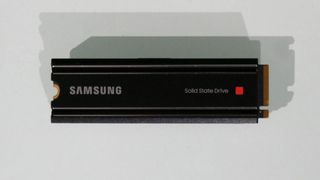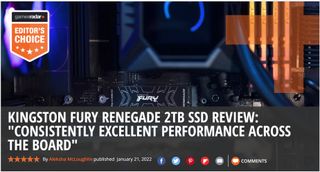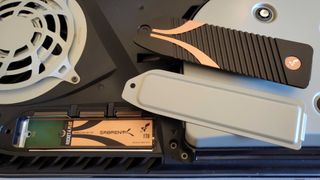At GamesRadar, we take testing and reviewing the latest SSDs and hard drives seriously. As storage becomes an integral part of all gaming setups, we want to make it clear how we give attention to those products vying to get into our best SSD for gaming and best PS5 SSD guides.
Whether it's the latest in Gen 4.0 NVMe technology or something a little more modest on the external front, every data drive that passes our desks is treated equally to discern which is right for our readers.
How we test SSDs at GamesRadar

Given that NVMe SSDs continue to claim faster speeds, one of the first things that we do is test the alleged read and write figures. We do this utilizing two industry-standard programs, these are CrystalDiskMark and AnvilPro; the former is used to test the sequential figures against what's advertised (tests which are run at least three times to gain an average) and the latter to get an overall score of which can be contrasted against drives of similar spec.
The second testing method for SSDs relates to how these figures correspond to in-game performance. Generally, we will test how long it takes for games to boot, as well as loading times once inside, and how this drive compares to a more traditional hard drive.
What's also assessed, on both the PC and PS5 platforms, are the file transfer times, as moving around games and media is incredibly important when factoring in a new SSD into the mix. This is done on PS5 by recording the times it takes for files to make the jump from the internal storage to the new NVMe drive, and vice versa. This information is normally featured in both buying guides as well as corresponding reviews, too. It's the same story on PC, with both files being manually transferred over from standard HDDs and SATA drives onto the NVMe SSDs, as well as games being moved over through Steam's in-built transfer client.

How we finalize our SSD and hard drive review scores
There are four major factors that are considered when deciding our verdict:
- Value for money
- Sequential and random performance
- 'Real-world' load speeds and snappiness
- Compatibility, durability, and any features
Value for money when reviewing an SSD for a standalone write-up or for buying guide coverage is important to our ethos. Take Gen 4 NVMe SSDs for example, there are so many different models claiming faster speeds at higher prices, so our real-world performance helps break to the heart of the matter. If a Gen 4 drive is reasonably priced and hits the claimed sequential performance, then it's generally going to receive positive coverage.
Compatibility is another vital factor. While many NVMe SSDs and USB-powered external drives will be right at home on both PC and PS5, the minimum speeds will need to be met to run optimally. Nowadays, Gen 4 drives should be accommodated in Sony's latest console with a heatsink. Considerations are also made with whether or not a heat spreader or heatsink is included in the purchase, making it plug and play with the latter device.
Three-star write-ups are generally reserved for models which get the job done but could be held back by their lower sequential and random performance or being overpriced for what you get. Should an SSD or hard drive meet all our expectations well, then chances are it's going to receive either a four or even five-star review. Badges are also utilized to give our readers instant information on whether or not an SSD or hard drive comes 'highly recommended' by us (4-stars) or is an 'editor's choice' denoting the model being the highest accolade we can offer. This badge means that we consider the product to be the best of the range, and one we would continue using ourselves.
Read more on our holistic approach to gaming hardware in our full Hardware Policy.


